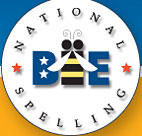Many of you may already have the Classroom Graded Lists. Unfortunately, I can't post the list, because it is copyrighted, but there is a free list with the words:(http://www.hexco.com/content/National_Spelling_Bee_2011_word%20list.pdf) The first few rounds at the school bee will usually have these words, then there will be off-list words. I stuggest studying the Consolidated Word List (CWL): http://www.spellingbee.com/consolidated-word-list. Some School Bees use Spell It!, which is also listed in the Hexco list above.
If you have not had your classroom bee yet, and your teacher is using words from the Classroom Graded Lists, you cannot ask for the origin, because it is not in the Classroom Pronouncer Guide. If your school uses the School Pronouncer Guide, which draws words from the Classroom Graded Lists and Webster's Third, you can ask for the origin. I do not have these lists, but the teachers and principal knew told us what we could ask.
You may know a specific root/combining form, but these questions are only entertained at the national level of the competition. A wrong answer can mislead the you. Study etymology patterns and their exceptions, and pay attention to the definitions of the words. For example, if you receive the word cytology, and you hear cell in the definition, you know the first four letters are c-y-t-o, and not s-i-t-o, c-i-t-o, s-y-t-o, etc.
The school spelling bee is not as nerve-racking as the National Spelling Bee. The school bee may be a little nerve-racking for spellers who have made it to nationals before or have been very close, because it is one wrong letter, and it is over. Although I am someone who is comfortable on stage, I only remember being nervous once, and I misspelled a word I knew (It was not my final Bee, although). You have to have confidence to stand up on the stage. Close your eyes if you need to, so you can concentrate on the word. Think of all the possible spellings of a word if you don't know it and choose the best one.
More Advice: Make sure the pronouncer pronounces the word correctly, and you pronounce it correctly back to him/her. Ask these questions, "Is the word pronounced correctly?" and "Am I saying this correctly?"
Good luck, and continue studying!

No comments:
Post a Comment